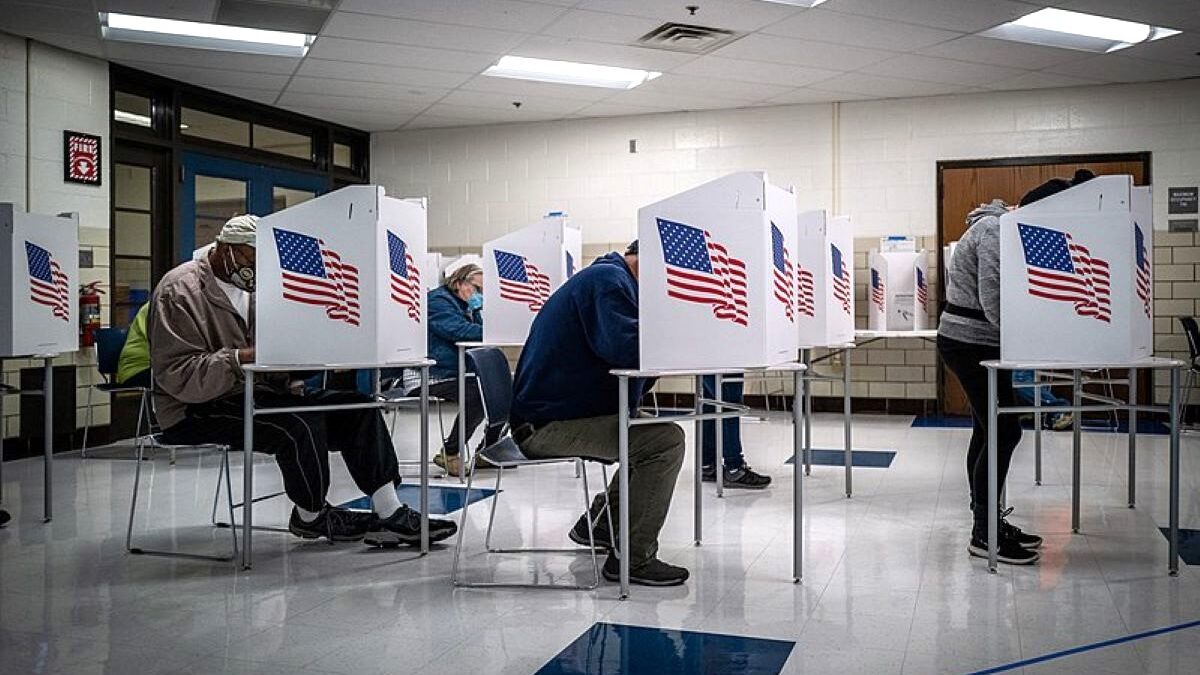
A federal court struck down Democrats’ request for a preliminary injunction seeking to block provisions of Georgia’s election-integrity law on Wednesday, ruling that plaintiffs showed no evidence the statute discriminates against black voters.
Writing for the U.S. District Court for the Northern District of Georgia, Judge J.P. Boulee ruled that in their lawsuit against Georgia state officials, the Biden administration and Democrat-affiliated groups “failed to show a substantial likelihood of success on the merits as to their claims that the provisions” of a Republican-backed election-integrity law “intentionally discriminate against black voters in violation of the Fourteenth Amendment, Fifteenth Amendment and Section 2 of the [Voting Rights Act].”
Signed into law by Gov. Brian Kemp in March 2021, SB 202 mandated voter ID for absentee voting and set rules against giving voters gifts or money within 150 feet of a polling place. The law also increased security around and limited the use of ballot drop boxes, tightened the time frame in which voters can request an absentee ballot before Election Day, and increased regulations around provisional ballots.
In their suit against Georgia’s leading officials, Democrats contended the aforementioned provisions intentionally discriminated against black voters. Regarding the law’s voter ID requirement for absentee voting, for example, plaintiffs claimed the provision “disproportionately impacts black voters” because the majority of registered Georgia voters without a valid driver’s license or identification card are black, and a larger percentage of black voters than white voters lack a valid ID.
In its Wednesday’s opinion, however, the district court dispelled Democrats’ argument that such statistical differences indicate an intent to discriminate. As Boulee noted, plaintiffs “presented no evidence that black registered voters fail to have the other acceptable forms of identification allowed by the statute at a statistically higher rate than white voters.”
“These other forms of identification include utility bills, bank statements, paychecks and other government documents that include a name and an address,” Boulee wrote. “Ultimately, without this additional evidence, the Court cannot find at this time that the Identification Provision has a disparate impact on black voters.”
Despite previously issuing a preliminary injunction blocking the enforcement of SB 202’s safeguards on giving voters gifts at polling places, Boulee argued on Wednesday the plaintiffs’ claim that the provision “disproportionately impacts black voters because black voters are more likely to wait in long lines at the polls” falls flat. The judge wrote that the differences in wait times between white and black voters “are not statistically significant enough to demonstrate that black voters wait in longer lines at a meaningfully higher rate than white voters.”
“Nonetheless, even assuming these percentage point differences were statistically significant, Plaintiffs’ expert concedes in his report that too few respondents reported wait times of longer than sixty minutes to make racial comparisons for those wait times reliable,” Boulee added.
The court also dismissed Democrats’ claims regarding SB 202’s drop box regulations, absentee ballot request deadline, and provisional ballot rules.
Despite SB 202’s benign changes to Georgia election law, Democrats and their legacy media allies smeared the statute as a GOP-led effort to “suppress” nonwhite voters. President Joe Biden grossly referred to SB 202 as “Jim Crow on steroids” and called on Major League Baseball to relocate its 2021 All-Star Game from Atlanta in protest. The MLB ultimately acquiesced, condemning the law and moving the game to Colorado. The decision cost Georgia an estimated $100 million or more in revenue. Coca-Cola and Delta were also among those to condemn SB 202.
Contrary to Democrats’ baseless claims that SB 202 would suppress Georgians’ ability to vote, the state saw record early voter turnout for the 2022 midterms and subsequent Senate runoff election. A poll conducted after the midterms revealed that zero percent of black Georgia voters said they had a “poor” experience voting in the 2022 contest.








